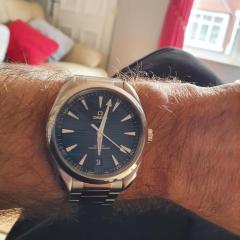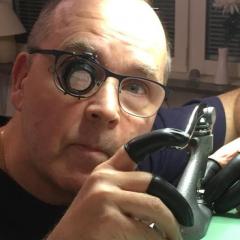Help with finding full time horologist schools in NYC?
-
Recently Browsing
- No registered users viewing this page.
-
Topics
-
Posts
-
By HectorLooi · Posted
This was what I was afraid of. The movement is not one of the generic black square modules. Remove the movement from the clock and try prying it open very carefully, without breaking the plastic tabs. The plastic might be brittle from age. Clean the wheels and check the battery contacts for corrosion. Check the PCB for bad solder joints. Take plenty of photos along the way. -
One of the problems with trying to Photograph Phils things are that his enjoyment was building these things so they tended to E falls on what will see if I can find some earlier pictures or any pictures I wasn't even sure because I was looking for that specific picture for somebody else and even it got the last version and that would have been the last version. You will note that he put the indexing on something that he could unscrew it or whatever and it can slide back out of the way so the rest of the lathe can be used as a lathe. With the lathe cut are actually coming down from the top I was there once where he demonstrated how to cut a pivot with the setup it was really beautiful. Older set up if I remember it's not a worm gear assembly in the thing in between the stepping motor and the holding block I believe this particular one was like a 100 to 1 gear ratio. Earlier version with watchmaker's lathe. Even looks like he is the watchmakers bed and then switch to something he made. Then I do have other pictures and things of the rotary stage in use. In the raw so if you tube videos here is an example of one were somebody's mounting a three jaw chuck. At one time there were available on eBay they were not cheap but if you're patient like I was I found one cheap on eBay. After you watch the video it look at his other videos he is a whole bunch of other examples of the same rotary stage. That I do know there are other pictures examples and possibly videos you just have to track them down. One of the minor issues of finding this particular tech sheet for the unit is I believe it was a custom manufacturer and the company change their name but I remember the new name here's a link to the company https://www.ondrivesus.com/rino-mechanical-components
-
Escapement adjusting always interesting and depending upon the reference always confusing. Okay maybe it's not always confusing but it does lead to confusion. I have a PDF below it's actually a whole bunch of separate stuff including a hand out that came from a lecture that's on you tube. Then from that we get this image Consequences of doing things especially if you do things out of order or you do things for the wrong reason. Oh and even if the watches working I made the mistake one so showing my boss how tweaking the banking pins on a full plate on the timing machine made the amplitude get better and now he thinks that's what they're for and I don't think a fully grasped exactly what horn clearance means. Consequence of doing things. Notice what it says about opening and closing the banking pins and total lock? So yes I've had that on a full plate where it won't unlock at all and that's the banking pins or a combination of things basically. So banking pins unfortunately get moved. One of the ways to tell if it's been moved is the look straight down at the end of the fork with the balance wheel removed. Power on the fork push at the one side look at it push it to the other side also look at it and compare anything with the center reference the balance jewel and see if both sides of the same. No guarantee after the same there in the right place but at least are the same typically when people play with things one side will be way off from the other because they had no idea what they were doing at all because of course it's a full plate and you really have to paying attention and even then there's still hard to do. Then the other thing that comes up like it shows below is people often adjust the banking pins to do all those other things as opposed to horn clearance which is all that it's therefore and maybe bonus Guard pin clearance although you're supposed to deal with the guard pin is a separate thing like single roller gets bent in Or out or sometimes physically gets moved in and out. Some full plates older escapement's typically pallet forks held together with screws and you can actually unscrew and move the entire assembly in Or out more complications to deal with. Escapement handout wostep nscc.pdf
-
If he was much younger and some sort of sports player it wouldn't be a problem. They would be in there and doing surgery and he'd be back on the field in no time. Unfortunately when you get older little things are bad and big things can be really bad so not good at all.
-
Where I work everything incoming watches whatever detailed descriptions are taken entered into a computer program and photograph of each item. Then ideally although it depends on who's doing the paperwork detailed descriptions can be quite good other times there lacking. Like I really like it with pocket watches if they would record the serial number it avoids confusion later on. Then when watch repairs are completed that is also entered in. It's one of the amusements I learned when I was in school instructor had a shop and commented about the important aspect of keeping detailed records of repairs. Because oftentimes a customer who got a new crystal will come back later on when the watch doesn't work and expect you to fix the entire watch for free. Then you can remind them that they just got a crystal. Strangely enough that keeps coming up or occasionally comes up where I work now. One of the problems of using the service marks on the case is that in the case of pocket watches oftentimes that's not the original case. Then case marks? What I was doing warranty work for a company I used to describe a code number in the back of the case and it would tell me the next time I see the watch that basically what I did I made no attempt at keeping track of customers because we had literally thousands of them I think they sold 30,000 of these watches and they would come back by the hundreds because they had a lifetime warranty. Yes that's a story all of itself but I would put a code number that would reference what was done to the watch the last time and think I had a date in there somehow so it did tell a story if you knew the code. Another shop I once worked out the number would reference the page in the book. So other than knowing we had been in there you would have no idea what happened because you have to go look at the page in the book to see what happened. Then the problem of how you examine a watch you should examine the watch in detail every single time to avoid complications. Although on vintage watches and this is a of amusement I have at work when people ask something and I say of the watches done when it leaves. This is because on vintage oftentimes problems won't show up until the watches much farther into the repair like it's now running and you discover things that you can't discover before because it wasn't running to discover them that also become sometimes difficult to have exact rigid prices are estimates of repairs or in the case of a pocket watch you may not find out if a casing problem to later on when you case it up in the watches running. I was just thinking for all those people that would like to leave a mark maybe you should learn to do what some of the past watchmakers did? Leave a mark but leave it in such a way that no one will ever find it? Typically not done for repair purposes but done for other reasons like identifying it's legit. I have a friend with a Gruen watch and one of the Roman numbers the bottom line that just looks like a line under extreme magnification actually says Gruen watch company or something equivalent. So here's a link showing how to mark your watch without being seen although that's not the actual title. So if you can learn micro engraving you can engrave the watch someplace probably just about any place you just have to remember where you put it. https://cnaluxury.channelnewsasia.com/obsessions/how-to-prove-if-watches-are-authentic-secret-signatures-182516
-





Recommended Posts
Join the conversation
You can post now and register later. If you have an account, sign in now to post with your account.
Note: Your post will require moderator approval before it will be visible.